These Seven Terriers Are Running the Boston Marathon to Help Others
Their aim: raising funds for cancer and diabetes research, Boston Children’s Museum, student scholarships, and more
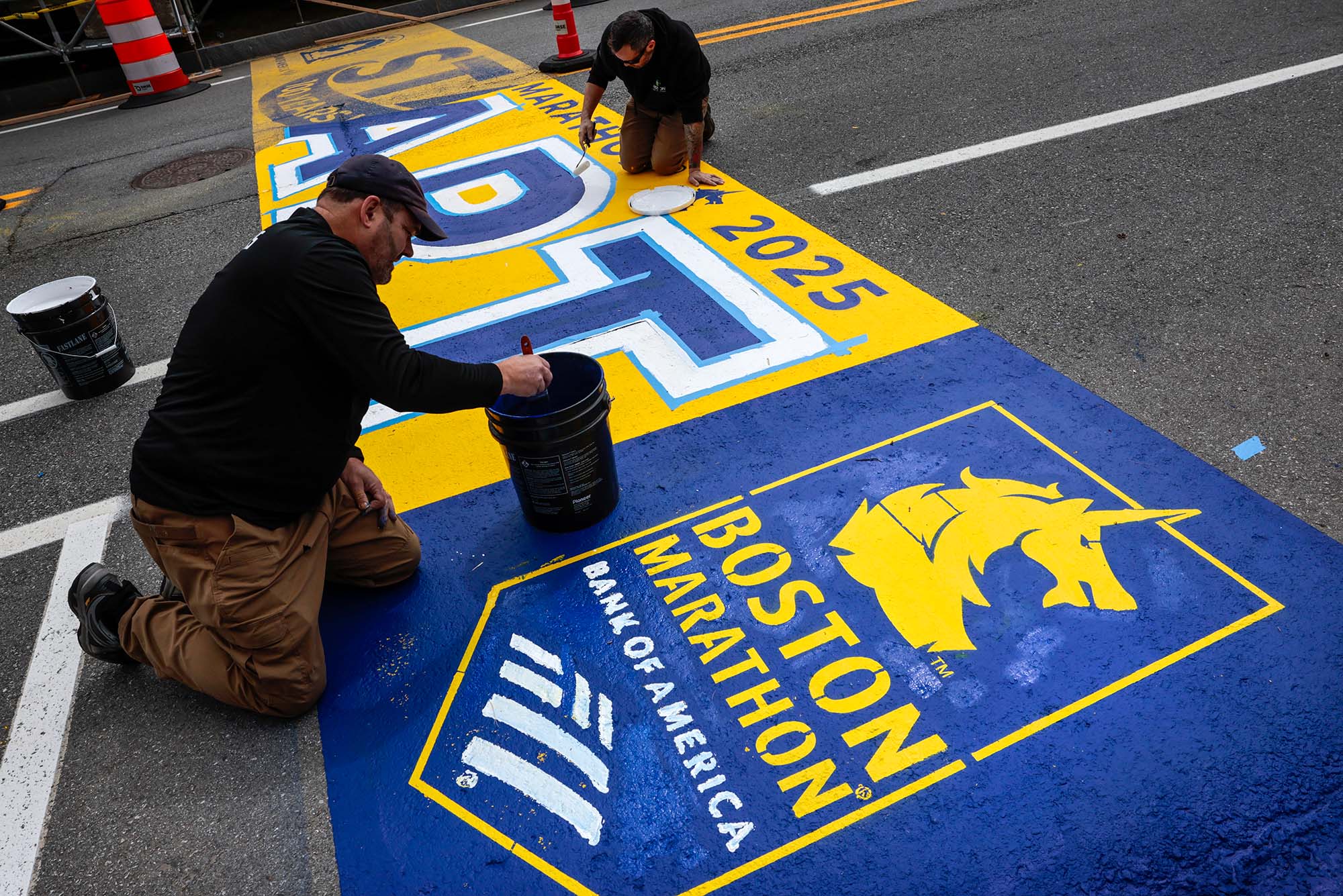
Employees of Mission Turf Services puting the finishing touches on the starting line for the 129th Boston Marathon. Photo via Getty Images/Craig F. Walker/The Boston Globe
These Seven Terriers Are Running the Boston Marathon to Help Others
Their aim: raising funds for cancer and diabetes research, Boston Children’s Museum, student scholarships, and more
Every April, the best runners from around the globe gather in Boston for the annual Boston Marathon. This year’s race—the 129th—will be run Monday, April 21, and approximately 30,000 runners will take on the 26.2 mile course stretching from Hopkinton, Mass., to Copley Square.
The lion’s share of runners—more than 20,000—were eligible to run this year’s marathon by passing the qualifying time for their age group. The remainder of the field consists of runners—many from the BU community—participating in the Bank of America Boston Marathon Official Charity Program. After raising the minimum amount of money required, they are eligible to run for an approved charity. We talked with seven of those members of the BU community, who share their stories about why they’re running this year and the charities they’re running for.
Silvia Chen (CAS’16)
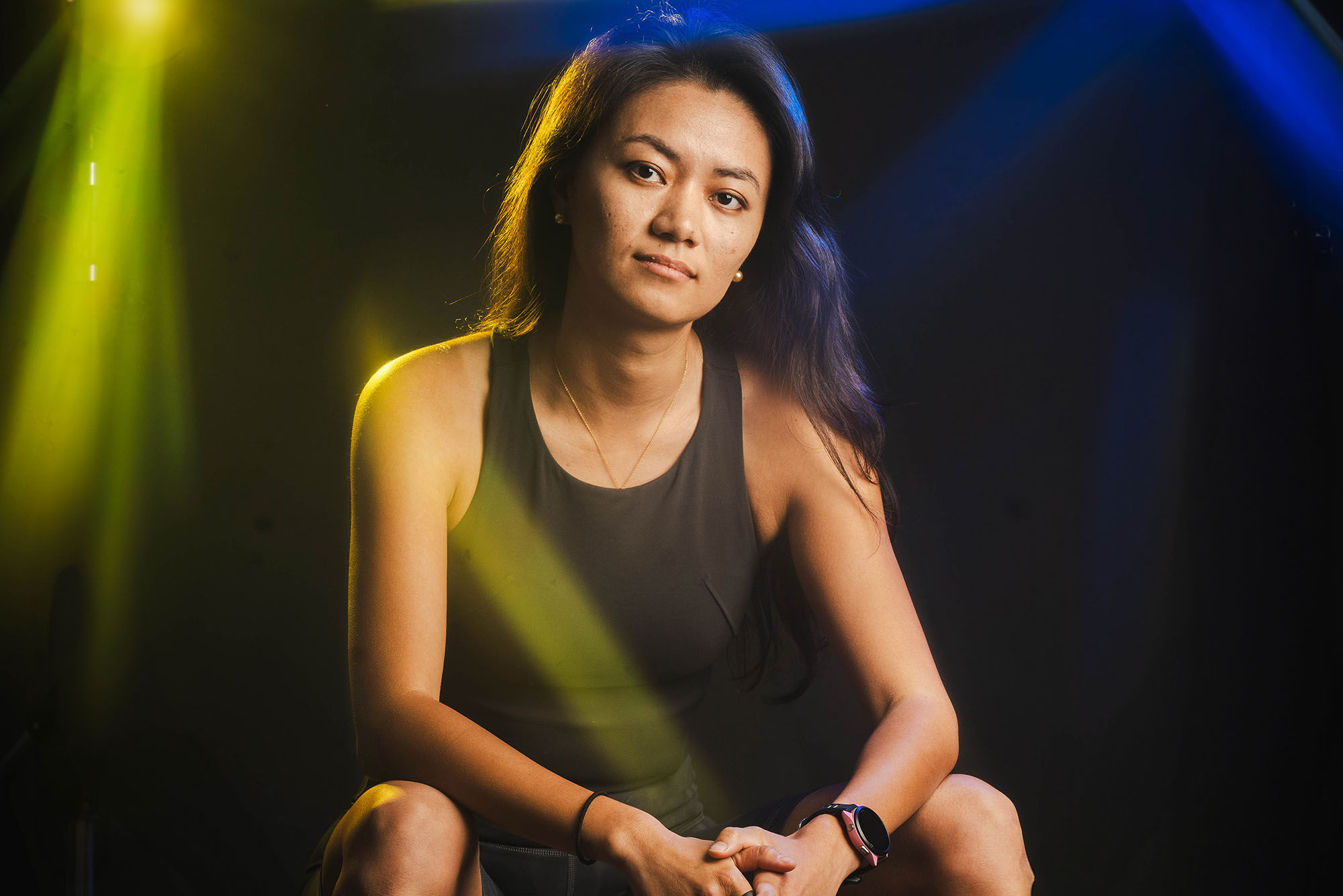
As an international student from China, Silvia Chen was excited about experiencing her first Boston Marathon in 2013. She made plans with friends to head to the finish line to cheer on the runners.
Then, as she was walking down Boylston Street, she heard the bomb go off at the finish line.
“Everyone started screaming and running around. I was like, ‘What is going on? What’s happening?’” Chen says. “It was just like a war zone, but in Boston, and it was very shocking and out of place.”
As Chen made her way back to the BU campus after the bombings, ambulance after ambulance passed her, racing down Storrow Drive to help injured runners and bystanders.
She later learned that BU student Lu Lingzi (GRS’13) was among the three people killed in the bombings. Like Lingzi, Chen was a single child and understood the tremendous loss that her classmate’s parents must be feeling.
Fast forward 10 years, Chen, about to turn 30, started looking back on chapters in her life that weren’t closed yet—the Boston Marathon was one of them.
In the video above, Silvia Chen (CAS’16) talks about being near the Boston Marathon Bombings in 2013 and how that experience motivated her to run this year’s Boston Marathon.
That day has continued to impact Chen. She says she still tears up watching the final 100 meters of the marathon. She decided to run this year’s marathon as a way of confronting what she experienced 12 years ago.
“I’m not walking away from it. I’m not ignoring it. I’m facing it straight. I’m staring at it, and I’m gonna sew it up myself,” Chen says. “I will be able to run across that finish line and prove to myself, to the world, that you cannot break unity. You cannot break people’s strengths in a violent way—we always come back with a sense of strength.”
Chen started training for Boston from her home near San Francisco. As a lifetime sprinter, she acknowledges that the transition to marathon running was “absolutely terrible.” But she ran last year’s San Francisco Marathon and is running the Boston race for the Lingzi Foundation, established in honor of her classmate. The nonprofit provides educational opportunities to children and recognizes those building bridges between cultures and communities.
“Every year, people carrying her name go through that finish line again and again and again and again,” Chen notes. “You can’t destroy us this way…we come back way stronger.”
Reshab Chhabra (CAS’24)
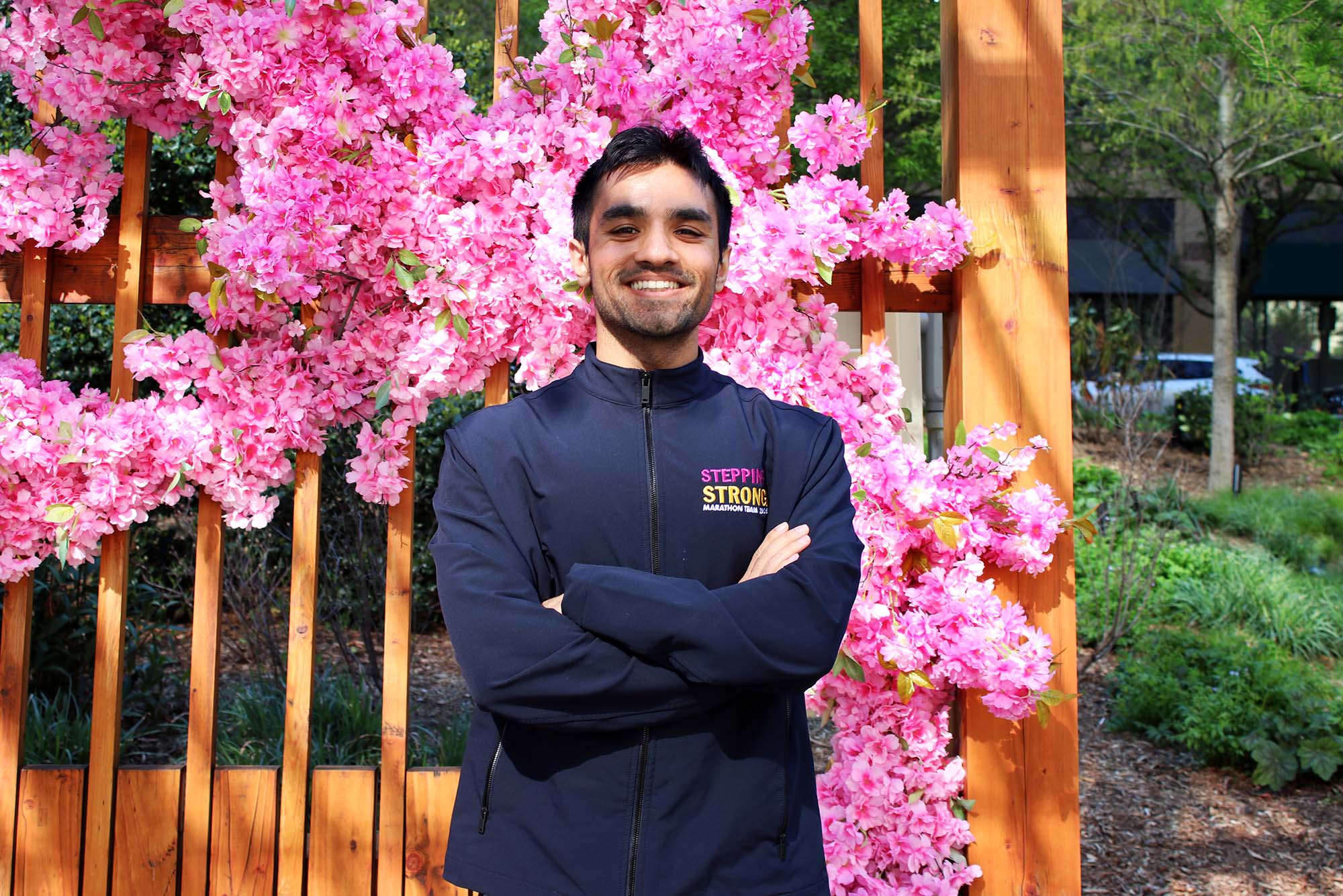
When Reshab Chhabra crosses the finish line of the Boston Marathon Monday, he knows there will be tears.
He was in high school when his best friend was diagnosed with a form of brain cancer called medulloblastoma. Chhabra wanted to spend as much time with her as he could, and one thing she wanted to do was run a marathon. So, he ran with her as she trained for a qualifying time. Sadly, she died before she was able to run the marathon.
“I was noticing that it was getting more and more and more difficult for her,” Chhabra says. “I wanted to finish it for her, because I saw how much pain she went through.” Now, he has a chance to do just that. He is running for Brigham & Women’s Hospital’s Stepping Strong Center for Trauma Innovation, which provides trauma care for injured civilians and members of the US military. Chhabra says most of the funds he raises will be going towards brain cancer research.
Chhabra’s journey to this year’s Boston Marathon has been far from linear. He’s been training for the race since his high school senior year, but a series of injuries, including a torn Lisfranc joint in his foot he suffered during his BU senior year threatened to derail his dream of running.
He was told he couldn’t run long distances anymore, and his foot swells every time he runs. But as a self-described “stubborn guy,” he remains undaunted.
“That was the most annoying thing that my athletic trainers had to deal with. I was extremely stubborn. I did not want to stop. No matter what,” Chhabra says. “I want to run for my friend.”
Now a year removed from graduation, Chhabra is finally ready to run his first Boston Marathon. Because of his injuries, he says, it will also be his last. As he finishes the race for his friend, he knows that at the minimum, there will be tears.
“Knowing that I’m able to just finish the tracks for her puts my mind at ease,” Chhabra says. “Seeing her dreams go unfulfilled due to something as horrendous as brain cancer, it feels like I’m walking in her shoes to help achieve this for her.”
David Somers (GRS’93)

Five years ago, David Somers couldn’t run a mile.
Somers (GRS’93), a College of Arts & Sciences professor of psychological and brain sciences, had wanted to run the Boston Marathon ever since he watched his first race as a BU PhD student. But over the years, he became less physically active and slowly began to give up on that dream.
Then a few years ago he was hospitalized with what he calls a “bunch of health issues.” With the COVID pandemic keeping him from the gym, Somers turned to running.
At first, he wanted to run a mile, an ambition that proved more difficult than he thought initially. It took nearly a year to reach that milestone. Then he was able to run 4 miles, then 7, then 17. He thought: “Geez, I’m not that far away from a full marathon.
“I went from, basically, hospital bed to six-star finisher in five years,” Somers says.
He has since run the Boston Marathon, as well as other major world marathons, including Chicago, London, New York, Berlin, and Tokyo. This Monday will be the first time he’s run the same marathon twice.
He will be running for the Joslin Diabetes Center. Somers has two daughters with type 1 diabetes, and he says the center has provided a great deal of support to his family over the years.
“Anybody who’s had a child with a chronic illness knows it blows up your family. Everything becomes about, how do we make this work?” Somers says. “The Joslin clinic team really are just fantastic—a very integrated approach of: how are we going to help this child? How are we going to help this child’s family move forward and lead a rich life? I’m just so grateful for being 22 years in with the Joslin clinic.”
Somers says what’s impressed him the most about the Boston Marathon is that every runner has a story to share.
“You go from world-class athletes, world champions, to your neighbors, all in one event, if you just wait long enough for people to come by,” he says. “There’s going to be almost 30,000 people there, and some of us look old, some of us should lose a little weight, but we’re still out there doing it. And everybody has their reason, has their why, has their story.”
Enrique Gutierrez Wing
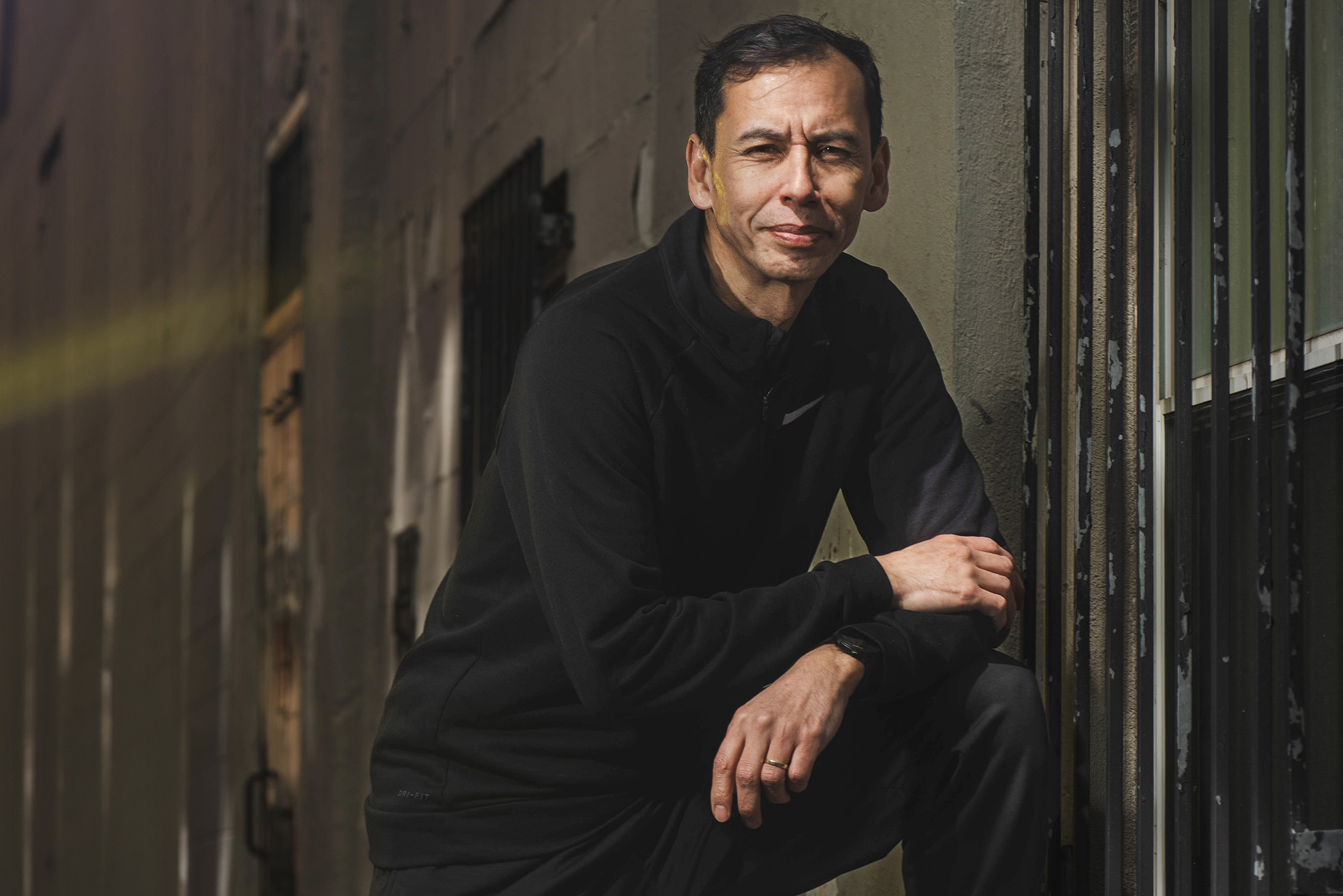
Enrique Gutierrez Wing first moved to Boston in 2013, three months before the Marathon Bombings. Every year since, he has watched the race pass by his house in Brookline and thought: “I’m going to run it one day.”
A College of Engineering master lecturer in mechanical engineering, Gutierrez has always loved running, but he struggled to get to the level required of a marathon runner—until he joined the Boston Roadrunners, a running club that taught him proper training and nutrition.
“I would have never thought about [running the Marathon] if I had to train on my own,” Gutierrez says. “After eight months of training with them, I thought I could run my first marathon.”
His first marathon was in Baton Rouge, La., in January 2024. The humidity made it difficult, but he completed it, although just a few minutes short of the qualifying mark for Boston.
“I was kind of shaky because I had never run anything close to that, but I finished it. I’m not gonna say in what condition I finished it, but I finished,” he says. “My legs felt like just two pegs.”
Seven months later, Gutierrez ran California’s Santa Rosa Marathon. He finished the race, which wound through vineyards, in 3:12.53, about 22 minutes below the qualifying time. He says he knew then that he had to run Boston.
Gutierrez says he’s proud to be running for the Iris Johanna McDaniel Memorial Scholarship, named in memory of his BU colleague Gregory McDaniel’s daughter, who died in 2020 at age 22.
The scholarship, run by UMass, supports students who are facing homelessness or food insecurity while getting a college degree.
“I grew up in Mexico, and I started in Mexico,” Gutierrez says. “I do not come from a high-resource community. I know what it means to do a university degree while having to shift with a job and having to do other things. It’s hard. I want to create awareness that there are people within our community, even though you might not see it at BU, who are really in need.”
Sam Moller
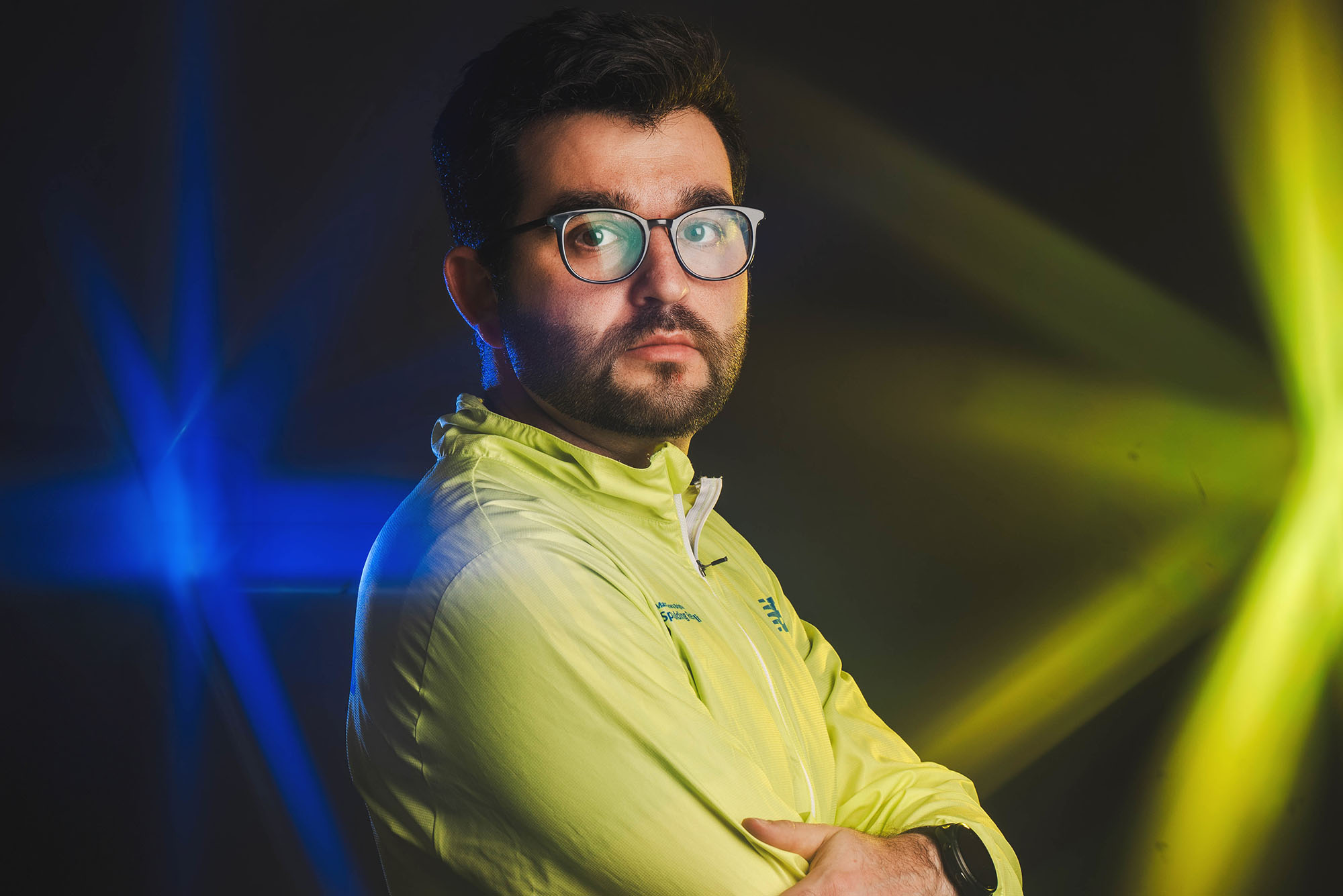
Sam Moller’s journey to the Boston Marathon went from 0 to 60.
In the span of a year and a half, he went from never having run a 10k race to competing in an ultra marathon, where he ran about 32 miles. Now, Moller, BU Sustainability assistant director of communications, is going to fulfill a childhood dream: running in the Boston Marathon.
A Needham, Mass., native, Moller lived right off Heartbreak Hill, one of the Boston Marathon route’s most notorious challenges. He says that seeing runners motivate themselves up the hill was an inspiration.
“It was less so the elite runners, and more so the average people that were running, trying to test themselves and test their limits…that was really my favorite, because that’s when the noise really builds,” Moller says. “Everybody in the community comes out for it.”
While living in Washington, D.C., Moller played competitive ultimate frisbee for 14 years. But after he returned to Boston, a friend started a running club, and Moller decided to check it out. He hasn’t looked back since.
He is running for Spaulding Rehabilitation Hospital, which cared for many of those wounded in the Boston Marathon Bombings.
“Pretty much everywhere across Boston, people really felt personally impacted by what happened on that Marathon Monday,” Moller says. “Spaulding was able to uplift the community in a way because they helped with the recovery.”
Sara Corey (LAW’27)
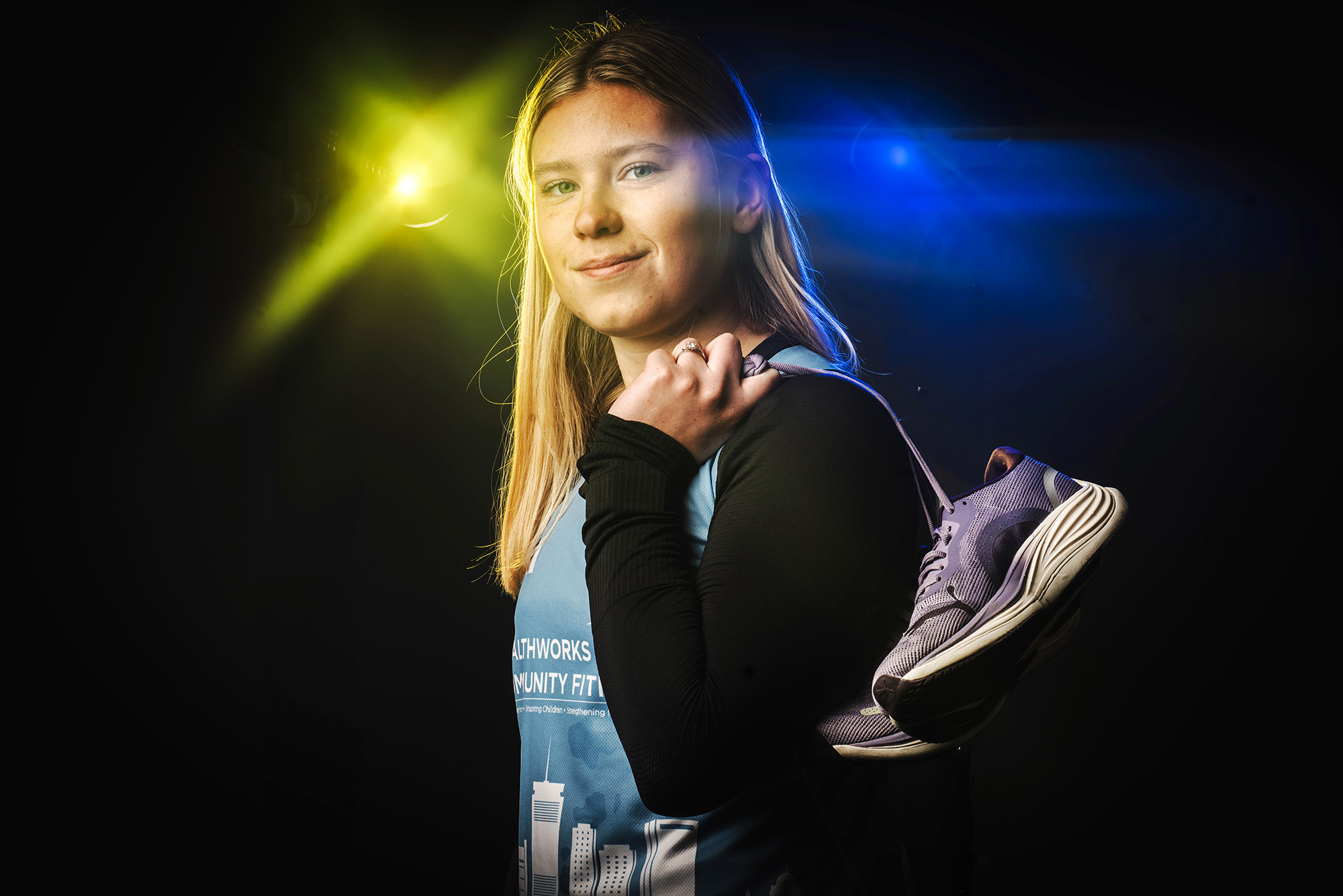
While an undergraduate at Northeastern, Sara Corey (LAW’27) worked in the Criminal Division of the U.S. Attorney’s Office in Boston. Working on violent crime cases there, she noted that many of the victims came from lower-income and underrepresented communities.
One of those communities she noted in particular was Dorchester. This is why Corey, a first-year BU law student, decided to run this year’s Boston Marathon in support of Healthworks Community Fitness, a nonprofit gym centered in Dorchester that provides fitness options for women in underserved communities.
“It was really important to try to give back to a community like that, one that really needs support,” Corey says. “Healthworks creates a unique sort of community-building atmosphere, where women don’t have to be so strong emotionally and don’t have to be so resilient.”
Healthworks Community Fitness has served over 20,000 women and children since its creation in 2002. The nonprofit also partners with public hospitals to create treatment plans that prevent diseases like diabetes, and it runs a nonprofit health food grocery store, the Daily Table.
“In this society, we’re so reactive. But Healthworks Community Fitness allows us to be proactive and to help people right at the root of our community,” Corey says. “I’m looking forward to representing a bunch of women who really deserve a voice.”
A former coxswain on the Northeastern rowing team, Corey has been running her whole life, but says she became more serious about it after her collegiate career ended. Boston will be her first marathon, and she hopes her experience motivating others on the Northeastern rowing team helps her on Monday.
“I’m motivating all of these women around me to go that extra mile, to harness something within them to go faster,” Corey says. “That’s something that I can tell myself when I’m at mile 20.”
Brendan Wilcox (Questrom’24,’26)
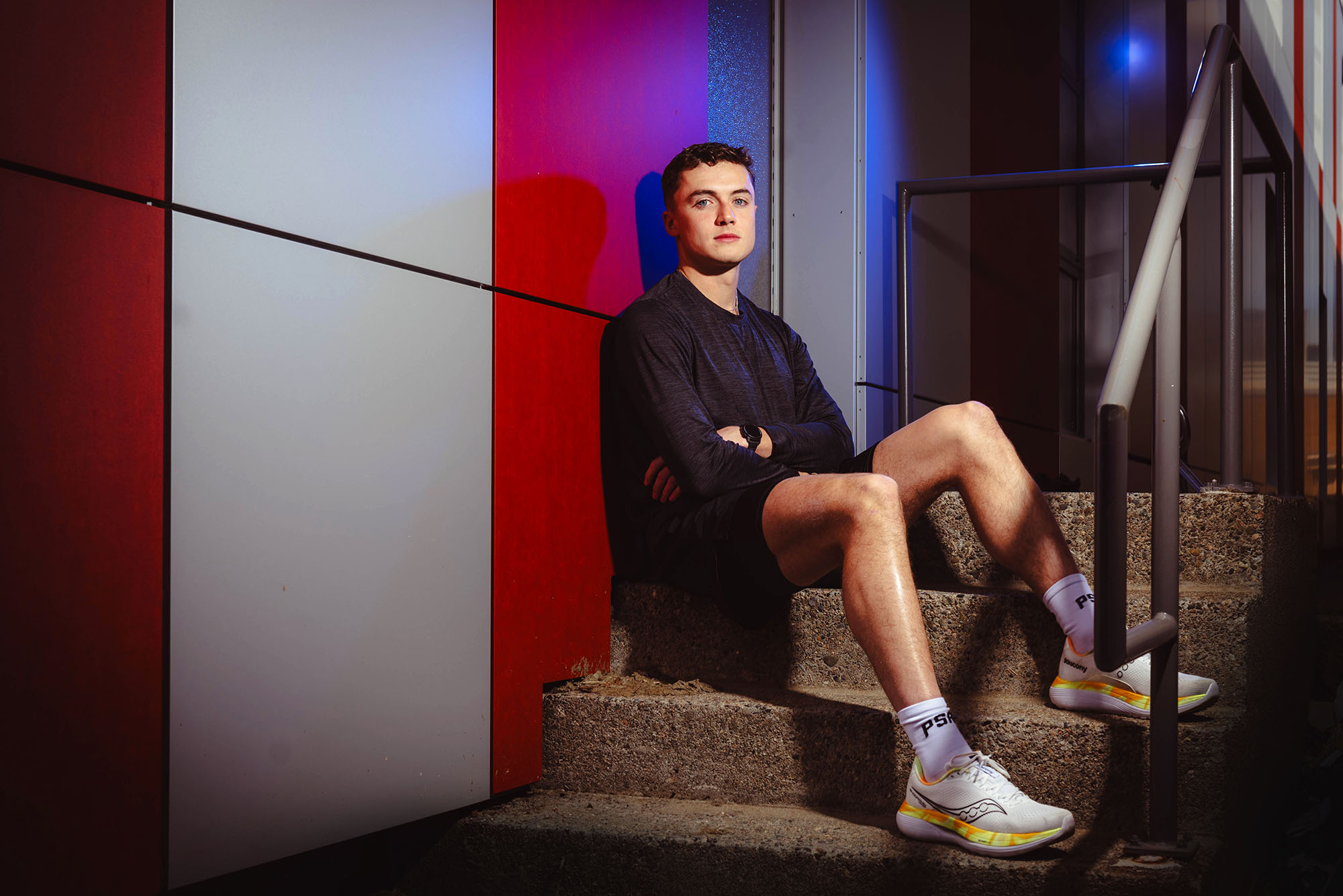
When Brendan Wilcox was studying abroad in London in fall 2023, he started running a four-mile loop from his South Kensington dorm to Hyde Park. The weather across the pond was “optimal for running all the time,” he recalls, and to his surprise, he discovered he enjoyed it. So he extended his route to 5 miles, then 10 miles.
Finally, the thought struck him: “Why don’t I just try to sign up for a marathon?”
Wilcox was recruited as a midfielder on the BU lacrosse team, but a series of injuries derailed his career before he could play a game. Unable to play lacrosse, he quit the team in 2022 and took up skiing and working out at a gym before landing on marathon running.
“I was missing that competitive aspect that I got with lacrosse, so I signed up for [a marathon],” Wilcox says.
The Lake Placid Marathon was his first, and he ran the 26.2 mile course surrounded by nothing but mountain roads and trees. That “desolate” marathon proved a good experience, but he acknowledges that the Boston Marathon will be a much different experience, with fans lining suburban and city sidewalks.
Wilcox is running in support of the Boston Children’s Museum in Seaport. Growing up in upstate New York, he frequently visited the Museum of Science & Technology in Syracuse and the Strong National Museum of Play in Rochester. His fondest memories growing up are being terrified of the dinosaur exhibition and walking around a child-sized Wegmans.
“Those were kind of unintentional, major memories that I had,” he says. “If you can keep promoting things like these museums and educational experiences, it will be good for families going forward. In the US, we have a big problem with not having enough third spaces.”
Wilcox has already practiced on the Boston Marathon course and says he’s looking forward to Monday’s crowds.
“You look back on everything that’s happened throughout your life, and all those little things kind of add up to making you who you are, and all the stuff you’ve learned,” he says. So his motivation for Boston: “Being able to give back in the sense of investing in those things that help build you to what you are…and being grateful for what you came from.”
The 129th Boston Marathon is Monday, April 21, starting at 9 am. The race will be televised live on WCRB TV, Channel 5, and can be livestreamed here.

Comments & Discussion
Boston University moderates comments to facilitate an informed, substantive, civil conversation. Abusive, profane, self-promotional, misleading, incoherent or off-topic comments will be rejected. Moderators are staffed during regular business hours (EST) and can only accept comments written in English. Statistics or facts must include a citation or a link to the citation.